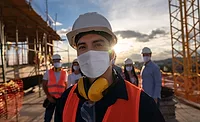The Shield: Navigating Liability in the Construction Industry During the COVID-19 Pandemic

The winter of 2019 saw the onset of the largest global pandemic since the 1918 Spanish Flu. COVID-19 (the coronavirus) is a highly-contagious, novel coronavirus that has resulted in widespread economic shutdowns, increased governmental regulation of daily activities, the closing of businesses, re-opening of businesses, and even the re-closing of businesses in some cases.
The onset of the coronavirus has created an inherent risk associated with the operation of a business during the pandemic. As recently as Sept. 8, Senator Mitch McConnell has expressed a willingness to “return to the table” for negotiations on a second, broad sweeping coronavirus relief package. Among the topics to be discussed is the Republicans’ demand for a legal liability shield, which would protect businesses from potential litigation concerning the coronavirus. Legal liability shields are intended to provide a degree of immunity to businesses, schools, healthcare providers, and related entities for legal liability from claims related to the coronavirus under certain circumstances. An underlying goal of the legal liability shield is to encourage businesses to reopen during the pandemic by limiting potential liability from individuals who may contract the coronavirus.
While President Trump has remained largely silent on the issue of a legal liability shield, his administration has backed liability protections for businesses. Currently, the following states have enacted versions of the legal liability shield: Alabama, Arkansas, Georgia, Iowa, Kansas, Louisiana, Nevada, North Carolina, Mississippi, Oklahoma, Tennessee, Utah, and Wyoming. Illinois, Massachusetts, Michigan, New Jersey, New York, Ohio, and South Carolina have proposed a form of the legal liability shield; however, no legislation has been finalized nor signed into law.
This begs a question: without a legal liability shield, should I be worried about myself or my company being sued if one of my clients or employees becomes sick? The answer depends on the context: the law commands that a person or business act as a reasonable person or business would under similar circumstances. Falling below the standard of care or caution expected from an ordinary and reasonable person or business could leave you on the proverbial hook for any harm suffered.
How, then, can I “shield” myself and my company from liability relating to the coronavirus? Even without legislative action to provide a corporate shield from liability, there are steps that individuals and businesses can take to provide a shield in effect. Acting as a reasonable and prudent individual or business does not require one to be extraordinary in their preparation — only reasonable. Reasonableness in a situation never before seen includes taking measures to educate employees and clientele regarding the dangers of and precautions necessary to combat the spread of the coronavirus. Additionally, businesses should implement measures which are reasonably calculated to keep their employees and customers safe. Beyond acting reasonably, companies can also protect themselves though contractual measures.
The Reasonable Business
The first step any individual or business should take in shielding themselves from liability is to become familiar with CDC guidelines, OSHA guidelines, and state-specific guidelines regarding business activity during the pandemic. Familiarity with these guidelines allows for individuals and businesses to implement safety protocols designed to keep both employees and customers safe.
The CDC’s guidelines for coronavirus prevention may be the best place to start. The CDC encourages employees to wash their hands regularly with soap and water or clean them with an alcohol-based hand sanitizer, maintain a 6-foot distance whenever possible, and to wear a cloth face covering whenever physical distancing is difficult. A positive coronavirus test for an employee triggers further CDC recommendation. The employee must self-isolate until the following three criteria are met: (1) 10 days have passed since the symptoms first appeared, (2) the employee has gone 24 hours with no fever without using fever-reducing medications, and (3) the employee’s other coronavirus symptoms are improving. If the employee is asymptomatic (not displaying symptoms of the coronavirus but has tested positive), the employee must self-isolate for 10 days.
Employers must also determine whether any other employees were also exposed to the sick employee by being within 6 feet of the employee testing positive for more than 15 minutes. If so, the employer should notify the potentially exposed employees of their exposure without identifying the sick employee. Employees who are exposed should self-isolate for 14 days after their last exposure even if the employee tests negative for coronavirus or has no symptoms. Finally, the employer should clean the area, tools, equipment, and vehicles that the exposed employee used.
The Occupational Safety and Health Administration (OSHA) has also released advisory recommendations to assist employers in providing a safe and healthful workplace. OSHA classifies work tasks into four exposure levels: lower, medium, high, and very high. Lower exposure risk levels occur where there are tasks that allow employees to be socially distanced with little outside contact with the public. Medium risk environments include tasks which require workers to be within 6 feet of one another and those that require workers to be within 6 feet of members of the public. High exposure risk environments include indoor work sites occupied by people suspected of having or known to have COVID-19, including people who are exhibiting symptoms of coronavirus.
Construction companies should educate their employees on recognizing the symptoms of COVID-19 and encourage any employee displaying such symptoms to stay home from work. To further shield themselves from liability, construction companies should encourage the wearing of masks, the maintenance of proper hygiene, including handwashing, and for employees to not share tools without sanitizing them between users. Companies should also post coronavirus-related safety protocols in offices, work sites, and in company vehicles.
OSHA further recommends limiting meetings only to the extent absolutely necessary, including safety meetings. When accepting deliveries at job sites, the delivery driver should remain in the vehicle and all tools, materials, and supplies should be offloaded by company personnel. It is also recommended that, whenever possible, to stagger work schedules by providing alternating workdays or extra shifts to reduce the total number of employees present on a job site at any time and encourage physical distancing.
In addition to normal personal protective equipment (PPE) required under OSHA’s standards for construction (29 CFR 1926 (E)), employers may also supply their employees and visitors with coronavirus-specific PPE including protective eyewear, gloves, and face-shields. To determine whether additional PPE is necessary, employers must consider the conditions of the work environment, including crowding and ventilation, when conducting a job hazard analysis.
Coronavirus Waivers and Releases
A second way that businesses can shield themselves from liability is through contract provisions that limit liability for the business if an employee or customer becomes sick. Such contract provisions should set the stage and contain a coronavirus disclaimer; outline a waiver, release, and forbearance of claims; provide for indemnification; and account for the potential need of severability of portions of the provision.
Setting the contractual stage is necessary for a customer to make a knowing and voluntary waiver and release of claims arising from transmission of the coronavirus. This serves as a “prelude” of sorts, and should identify the virus, the associated risk, and set the stage for substantive agreement between the contracting parties. The disclaimer portion should make clear that the business cannot, does not, and has not made any guaranties regarding transmission of the coronavirus and disclaims liability associated with the unintentional spread or transmission of the coronavirus.
The waiver, release, and forbearance of claims section contains the customer’s binding agreement to forego any litigation relating to the coronavirus. These sections should contain an agreement by the customer and all associated parties to waive and release the business from all past, present, or future legal action whether based in whole or in part on the spread or transmission of the coronavirus. This specifically excludes conduct that constitutes gross negligence or willful and wanton conduct on the part of the business or its employees.
Indemnification provisions are subject to modification for state-specific requirements. To the fullest extent permitted by applicable law, the customer should agree to indemnify, defend, and hold harmless the business and its agents for any legal actions related to the spread or transmission of the coronavirus excluding grossly negligent or willful and wanton conduct on the part of the business or its employees.
It is also important that any such contractual provisions contain a severability clause, which will allow for the remaining provisions to retain their legal effect in the event that any of the provisions are deemed invalid in the court of law. Given the novel circumstances posed by the coronavirus, there are not sufficient decisions to know with certainty the enforceability of liability waivers regarding unintentional spread or transmission of the coronavirus. A severability clause allows for provisions that are upheld by a court to be unaffected by provisions that may not be upheld, and for the unaffected provisions to remain legally binding and valid.
The Takeaway
It is important for businesses, especially construction companies, to tread carefully amidst the coronavirus pandemic. Businesses must stay proactive by updating both safety and human resources policies and updating agreements and contractual relationships to address coronavirus liability. Businesses should further review event agreements to ensure force majeure (Acts of God) provisions account for commercial impracticability or impossibility because of the coronavirus. Acting with care, caution, and attention to detail can help businesses shield themselves from liability relating to the coronavirus with or without government action to create a legal liability shield.
Disclaimer: The information contained in this article is for general educational information only. This information does not constitute legal advice, is not intended to constitute legal advice, nor should it be relied upon as legal advice for your specific factual pattern or situation.
Looking for a reprint of this article?
From high-res PDFs to custom plaques, order your copy today!







